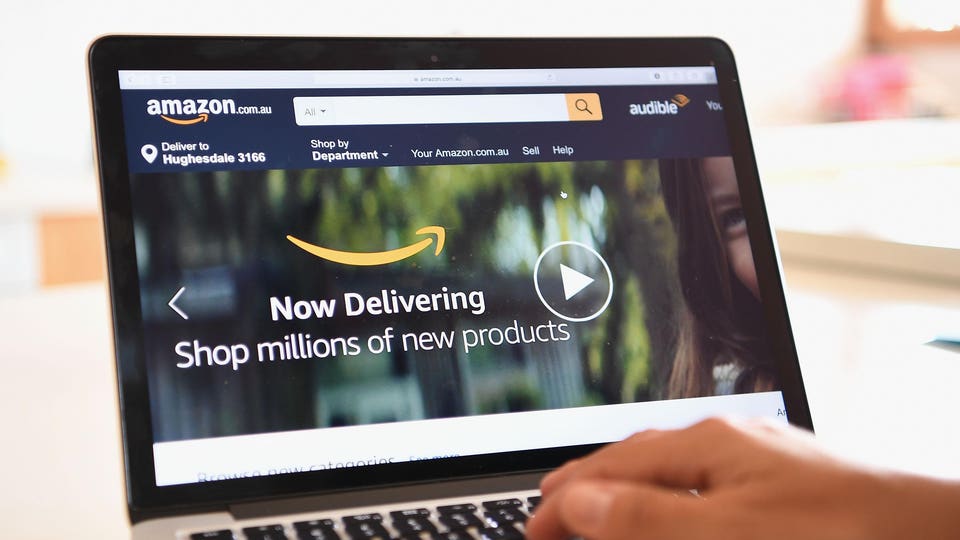Forbes Business Breaking Amazon Allegedly Used Secret Algorithm To Raise Prices On Consumers, FTC Lawsuit Reveals William Skipworth Forbes Staff I am a breaking news reporter. Following Oct 3, 2023, 06:14pm EDT | Press play to listen to this article! Got it! Share to Facebook Share to Twitter Share to Linkedin Topline Amazon, the behemoth online retailer, used a secret algorithm called “Project Nessie” to determine how much to raise prices in a manner in which competitors would follow, according to a lawsuit filed by the Federal Trade Commission. The Amazon website is seen on December 5, 2017 in Dandenong, Australia.
(Photo by Quinn Rooney/Getty . . .
[+] Images) Getty Images Key Facts The FTC calls Project Nessie “an unfair method of competition” that has “no valid and cognizable justification” and a violation of the FTC Act. Much of the lawsuit, including the portions that describe what exactly Project Nessie is, is redacted. However, the Wall Street Journal , which was able to view an unredacted version of the suit, reported that the algorithm was used to test how much the company could raise prices and have competitors still follow.
The algorithm was able to track how much Amazon’s power in the e-commerce field would get competitors to move their prices, and in instances in which competitors didn’t move their prices, the algorithm would return Amazon’s prices back down, according to the Journal . The algorithm also reportedly allowed the company to match sales from competitors, but when those sales ended at some competitors, Amazon would still be able to match a lower price. The algorithm, which is no longer in use, brought the company $1 billion in revenue, sources told the Journal .
Chief Critic Amazon has not yet responded to Forbes ’ request for comment, but Amazon’s top lawyer, in a statement last week to the Journal, said “If they (the FTC) were successful in this lawsuit, the result would be anticompetitive and anti-consumer because we’d have to stop many of the things we do to offer and highlight low prices—a perverse result that would be directly opposed to the goals of antitrust law. ” Key Background The FTC, along with 17 states, filed a hotly anticipated antitrust lawsuit against Amazon last week, accusing the company of illegally protecting a monopoly in online retail. The lawsuit described Amazon as a “monopolist” company that uses a “set of interlocking anticompetitive and unfair strategies” to “illegally maintain its monopoly power” on online retail.
Those strategies allegedly included anti-discounting measures that punish sellers who offer lower prices on platforms other than Amazon, incentive structures that force sellers to also use Amazon’s advertising and logistics services and replacing relevant search results with paid advertisements to promote Amazon’s own products and products that pay Amazon for the right. The lawsuit marks one of the largest antitrust efforts in decades. It has been expected for several years, after the FTC opened an investigation into Amazon in 2019, an investigation that expanded when FTC chair Lina Khan assumed the top role at the agency after President Joe Biden took office.
Tangent Khan, 34, has experienced a meteoric rise to prominence on the back of her lofty promises to break up monopolies, specifically Amazon. In 2017, while Kahn was still a law student at Yale University, she published “Amazon’s Antitrust Paradox,” an influential essay that offered a new perspective on antitrust law and specifically cited Amazon as a quintessential example of how big tech companies have become monopolistic and need to be reined in. After graduating and spending a few years working as legal counsel for the House Judiciary Committee, Biden appointed her chair of the FTC in 2021.
As chair, she has struggled to find success in her aggressive antitrust agenda. A lawsuit she filed against Microsoft to block its $69 billion purchase of video game publisher Activision Blizzard failed as well as another lawsuit suing Meta to block its purchase of the popular virtual reality app Within Unlimited. Further Reading Amazon Used Secret ‘Project Nessie’ Algorithm to Raise Prices (Wall Street Journal) Feds File Landmark Suit Against Amazon For Protecting Online Retail Monopoly (Forbes) Here’s How Amazon Could Be Broken Up After An FTC Lawsuit (Forbes) Follow me on Twitter or LinkedIn .
Send me a secure tip . William Skipworth Editorial Standards Print Reprints & Permissions.
From: forbescrypto
URL: https://www.forbes.com/sites/willskipworth/2023/10/03/amazon-allegedly-used-secret-algorithm-to-raise-prices-on-consumers-ftc-lawsuit-reveals/



